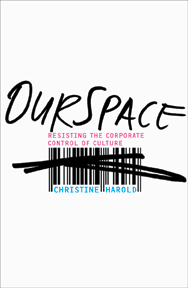Book Report of ‘Ourspace – Resisting the Corporate Control of Culture’ by Christine Harold
 This book really hit an personal snare with me, because I have been trying to avoid most commercial expressions by any medium for years now. I really regard it as an invasion of my privacy – I didn’t ask to be battered with consumerism for all my life – but it seems that’s just how everyday day life has to work, or so you start to think after a while… Everything and everyone is a potential sell-out or ‘moral’ betrayer in this mostly monetizing world and so you start to feel you can do nothing about it.. And ‘zapping’ away immediately as the commercials come on, installing AdBlock Plus as a Firefox extension, ignoring hand-outs on the street, etc. don’t seem all that constructive as a silent protest after you’ve read a few pages of Harold’s book.
This book really hit an personal snare with me, because I have been trying to avoid most commercial expressions by any medium for years now. I really regard it as an invasion of my privacy – I didn’t ask to be battered with consumerism for all my life – but it seems that’s just how everyday day life has to work, or so you start to think after a while… Everything and everyone is a potential sell-out or ‘moral’ betrayer in this mostly monetizing world and so you start to feel you can do nothing about it.. And ‘zapping’ away immediately as the commercials come on, installing AdBlock Plus as a Firefox extension, ignoring hand-outs on the street, etc. don’t seem all that constructive as a silent protest after you’ve read a few pages of Harold’s book.
In the introduction Harold defines the difference between ‘our-space’ – which is the space of everyone – and ‘their-space’ the space of corporations and government. She describes how modern day ‘anti-heroes’ have fought for the reclamation of our ‘shared space’ all-around us, which are invaded daily – by mediums like, billboards, commercials, banners and even in the skies with air-balloons and plain flyers. However the tactics of detournement used by the French Situationists International (like Guy-Ernest Debord) have changed since the 1960’s – the basic principals remain the same – turn the message around, jam their signals, make pranks, and most of all, expose the ‘hidden’ truths behind campaigns. As an example Harold describes how the sponsor for the American tobacco companies, Camel Joe, was used – in several remixes of the original versions – to show where a regular smoking habit leads too… Or the changing of digital voice boxes from Barbie dolls as a critical response to the fashion industries.
 Clearly, these kinds of movements have roots in the leftist way of anti utopian-thinking – traditional ‘pointing out’ of misshapes in society to the larger public – by using the cultural means the corporations and governments themselves created and supported, to completely different ends, distributing their ‘remixed’ messages through the mainstream mediums. But even though these methods seem appealing, for Harold it holds no real threat to global capitalism. These kind of tactics eventually lead to new ‘brands’ with their own agenda, like her example of Adbusters, which has become so mainstream that they function as a buisness-model for other companies. They themselves have embraced these kind of ‘guerilla’ tactics as marketing tools to make theirs brands seem cool, radical or even completely of charts to sell even more and more.
Clearly, these kinds of movements have roots in the leftist way of anti utopian-thinking – traditional ‘pointing out’ of misshapes in society to the larger public – by using the cultural means the corporations and governments themselves created and supported, to completely different ends, distributing their ‘remixed’ messages through the mainstream mediums. But even though these methods seem appealing, for Harold it holds no real threat to global capitalism. These kind of tactics eventually lead to new ‘brands’ with their own agenda, like her example of Adbusters, which has become so mainstream that they function as a buisness-model for other companies. They themselves have embraced these kind of ‘guerilla’ tactics as marketing tools to make theirs brands seem cool, radical or even completely of charts to sell even more and more.
A real or even ‘true revolutionary’ alternative to all modern day consumerism can by found in the Creative Commons, copyleft or all-round open source communities – for they are exploring a new route to intellectual property rights – which encourages innovation and participation in creative processes. It is no mystery that Lawrence Lessig has made great contributions, by legal and philosophical means, to our modern day internet culture – and it is therefore no surprise that Harold advocates and promotes his work in this beautifully and wittily written book – which was made with much attention, details and great concrete examples to put things in perspective.
Christine Harold (Ph.D., Penn State, 2002) recently joined the faculty in the Department of Communication at the University of Washington, Seattle. Previously at the University of Georgia, she teaches courses in rhetorical theory and criticism, popular culture, and social movements. Her research focuses on the relationship between commercial culture, rhetoric, and the possibilities for political engagement within contemporary capitalism. Her first book, OurSpace: Resisting the Corporate Control of Culture (2007, University of Minnesota Press) examines culture jamming as a response to corporate power. It advocates an “open content” ethic as one way to promote a robust public culture. Source: http://faculty.washington.edu/charold/info.html


